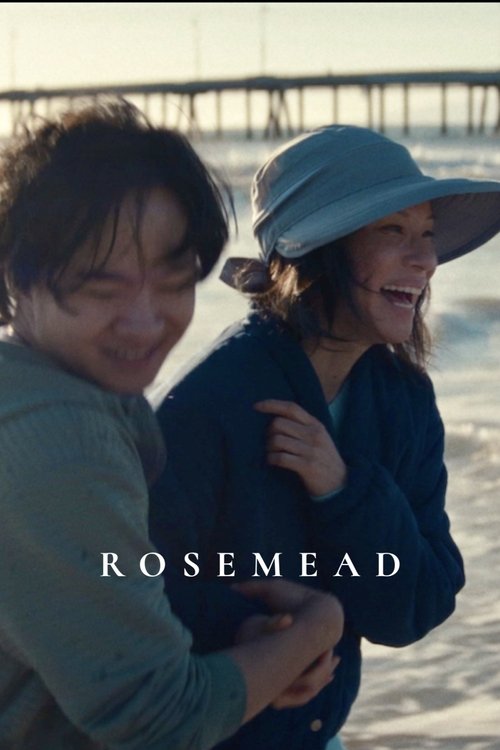
Ask Your Own Question
What is the plot?
Sorry, we haven't had the time to watch this and are working on a plot for this title. Check back in a few days.
What is the ending?
The ending of the 2025 film Rosemead depicts Irene, a terminally ill Chinese immigrant mother, taking a tragic and desperate action to protect her schizophrenic son Joe, who has a dangerous obsession with mass shootings. Faced with her deteriorating health and Joe's escalating mental instability, Irene ultimately shoots her son to prevent a potential massacre, then lies down beside him as the police arrive.
Expanding on the ending scene by scene:
The film's climax unfolds in a motel room, where Irene has checked in with Joe. The atmosphere is tense but quiet, a stark contrast to earlier joyful family moments shown at the film's start. Irene's terminal illness is now visibly worsening, and Joe's mental state is fragile and unpredictable. She watches him closely, aware of his fascination with violence and mass shootings, which has grown more alarming.
As night falls, Irene waits for Joe to fall asleep. The camera lingers on her face, showing a mixture of exhaustion, fear, and sorrow. She is fully aware of the moral complexity and finality of what she is about to do. When Joe finally drifts into sleep, Irene quietly takes a gun and shoots him twice. The shots are not loud or dramatic but carry immense emotional weight.
After shooting Joe, Irene lies down beside his body, holding him gently. This moment is intimate and heartbreaking, revealing her profound love and desperation. She does not flee or resist arrest; instead, she waits calmly for the police to arrive, accepting the consequences of her actions.
The film closes with the arrival of law enforcement and Irene's arrest, echoing the real-life case on which the story is based. The ending leaves viewers with a powerful image of a mother's tragic choice made under unbearable circumstances, highlighting themes of mental illness, cultural stigma, and the limits of parental protection.
In terms of character fates:
- Irene faces arrest and the legal consequences of killing her son, her health failing and her spirit broken by the ordeal.
- Joe dies from the gunshot wounds inflicted by his mother, ending his struggle with schizophrenia and violent obsessions.
- Other main characters, such as Irene's friends and community members, are not present in the final scenes but their earlier interactions underscore the isolation and cultural pressures Irene faces.
This ending is a direct, unflinching portrayal of a mother's last desperate act to protect her son and others from harm, capturing the tragic intersection of illness, fear, and love.
Is there a post-credit scene?
The movie Rosemead (2025) does not have a post-credits scene. None of the available sources or reviews mention any additional scenes after the credits for this film. The focus of Rosemead is a tightly paced, emotionally intense drama about a Chinese immigrant widow dealing with her son's schizophrenia and violent obsessions, and the film runs about 97 minutes without indication of extra post-credits content.
In contrast, some other contemporary films do include post-credits scenes, but Rosemead is not listed among them in comprehensive post-credits scene catalogs or film reviews. Therefore, viewers can expect the story to conclude fully within the main runtime without additional scenes after the credits.
What is the nature of Joe's mental illness and how does it affect his behavior in the film Rosemead?
Joe suffers from schizophrenia, which is shown to be worsening, possibly due to the recent death of his father. His illness manifests in concerning behaviors such as a fascination with mass shootings, watching related reports on television, and not taking part in an active shooter drill at school. His drawings and notes also reveal disturbing content, highlighting his deteriorating mental state (source ).
How does Irene's terminal illness influence her actions and relationship with Joe in Rosemead?
Irene is terminally ill with cancer, a condition she keeps secret from Joe. Despite her illness, she remains strong-willed and focused on protecting her son. Her deteriorating health adds emotional complexity to her character, culminating in a heartbreaking breakdown upon receiving bad news from her doctor. Her illness intensifies the urgency and desperation in her efforts to care for Joe (source ).
What is the significance of the motel room scenes in Rosemead?
The film opens in a motel room (room 213 at the Sunset Hill Motel) where a family is seen joyously dancing, showing a moment of happiness with the father singing, the son laughing, and the mother beaming. This scene contrasts sharply with the later tragic events, as the motel is also the location where Irene ultimately shoots her son Joe, an act driven by terror and desperation (source ).
Who are the key supporting characters in Rosemead and what roles do they play?
Key supporting characters include Charles (played by Orion Lee), Kai-Li (Jennifer Lim), Jeannie (Madison Hu), and Dr. Hsu (James Chen). While specific plot details about their roles are limited in the sources, Dr. Hsu likely represents a medical or mental health professional involved in Joe's care, and the others are part of the community or family network influencing or interacting with Irene and Joe (source ).
How does the film portray the cultural and linguistic aspects of Irene and Joe's lives?
The film integrates Chinese language heavily into its dialogue, with English subtitles, reflecting the immigrant experience. Irene speaks English with a thick accent and often converses in Chinese with other immigrants and her son, who responds in English. This bilingual dynamic highlights cultural identity and communication challenges within the family and community (source , ).
Is this family friendly?
The movie Rosemead (2025) is not family friendly due to its heavy and disturbing subject matter. It deals with a mother's struggle with her schizophrenic son who has a dangerous fixation on school shootings, culminating in morally complex and tragic decisions. The film explores themes of mental illness, cultural stigma, and extreme family crisis, which can be very upsetting for children and sensitive viewers.
Potentially objectionable or upsetting aspects include:
- Depictions of schizophrenia and severe mental health episodes, including erratic and potentially violent behavior.
- The son's obsession with school shootings, which is a sensitive and distressing topic.
- The mother's desperate and tragic actions taken to protect her son, involving intense emotional and moral conflict.
- Themes of death, terminal illness, and family trauma, including the mother's cancer and the recent death of her husband.
- The film's overall tone is described as downbeat, heavy, and challenging, requiring viewers to sit with discomfort.
Because of these elements, Rosemead is best suited for mature audiences and is not appropriate for children or those sensitive to mental health crises, violence, or family tragedy.







































